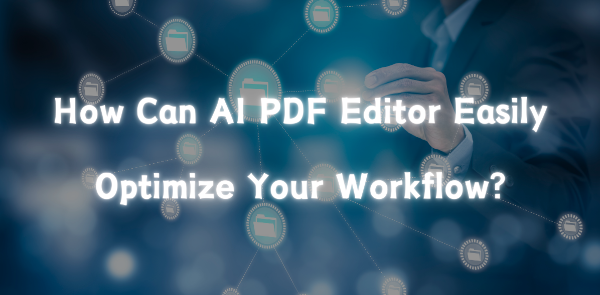Introduction
The digital transformation has significantly reshaped how we handle documents in both personal and professional environments. PDF files, known for their versatility and ability to preserve formatting across platforms, have become the standard document format worldwide. However, managing PDFs manually can be cumbersome, leading to the need for a more efficient solution. Enter AI PDF editors: advanced tools that leverage artificial intelligence to optimize document workflows, save time, and reduce errors. This article delves into the various aspects of AI PDF editors, their capabilities, and their impact on modern workflow optimization.
What Is AI PDF Editor?
AI PDF editor is a software tool that uses artificial intelligence to enhance the functionality of traditional PDF editors. Unlike standard PDF software, AI PDF editors can automate repetitive tasks, recognize patterns, and provide intelligent recommendations, making them a game-changer for document management.AI PDF editors combine natural language processing and machine learning algorithms to understand the content and context of documents. This allows users to interact with PDFs in a more intuitive and efficient manner. An integrated AI PDF Summarizer can quickly extract and present the key points from lengthy documents, saving users considerable time. Whether you’re merging multiple documents, extracting data, or converting files into different formats, AI PDF editors simplify the process with minimal human intervention. This technology not only saves time but also ensures accuracy and consistency in document handling, making it an essential tool for professionals across various fields.
How Does AI PDF Editor Improve Efficiency?
In the realm of document management, efficiency is key. AI PDF editors improve efficiency by automating tasks and providing smart solutions to complex problems. By integrating AI capabilities, these editors streamline workflows, enhance productivity, and reduce the likelihood of human errors.
Enhanced Document Editing
AI PDF editors offer advanced editing capabilities that go beyond basic text manipulation. By recognizing patterns and structures within documents, AI can intelligently suggest edits and corrections, saving time and effort. For instance, if you’re working on a contract, the AI PDF editor can automatically identify and highlight clauses that need attention. This feature is particularly useful for legal professionals who deal with lengthy and complex documents regularly.
Intelligent Data Extraction
One of the standout features of AI PDF editors is their ability to extract data intelligently. With AI-powered tools, you can effortlessly extract tables, text, and images from PDFs without losing formatting. This is invaluable for businesses that need to analyze data from various reports and presentations quickly. AI PDF Analyzer can automatically interpret and categorize data, providing deeper insights and enhancing decision-making processes. AI PDF editors can also convert scanned documents into editable text using optical character recognition (OCR), further enhancing efficiency and accuracy in data management.
Seamless File Conversion
Converting files from one format to another is a common task that can be time-consuming if done manually. AI PDF editors simplify this process by offering seamless file conversion capabilities. Whether you need to convert a PDF to Word, Excel, or PowerPoint, AI ensures that the conversion is smooth, with minimal loss of quality. This feature is essential for professionals who frequently need to present their data in different formats for meetings and collaborations.
Key Features of AI PDF Editor
AI PDF editors are packed with features that make them indispensable tools for document management. From automating repetitive tasks to offering intelligent insights, these editors revolutionize how we handle PDFs.
Natural Language Processing (NLP)
Natural Language Processing (NLP) is a core feature of AI PDF editors. It enables the software to understand and interpret human language, allowing for more intuitive interactions with documents.
- Content Summarization: AI can quickly summarize long documents, providing users with concise insights and saving valuable time.
- Language Translation: AI PDF editors can translate documents into multiple languages, making them ideal for international business communications. For instance, AI PDF Translator seamlessly converts the document’s content into the desired language while maintaining its original formatting and structure, facilitating global collaborations and communications.
- Contextual Understanding: By analyzing the context, AI can suggest relevant edits and highlight critical information, improving accuracy and efficiency.
Machine Learning Algorithms
Machine learning algorithms empower AI PDF editors to learn from user interactions and improve over time.
- Pattern Recognition: AI can recognize patterns in documents, helping users identify trends and insights.
- Automated Workflow Optimization: Machine learning streamlines workflows by predicting user actions and automating repetitive tasks.
- Personalized Recommendations: AI provides personalized suggestions based on user preferences and past interactions, enhancing productivity.
Optical Character Recognition (OCR)
Optical Character Recognition (OCR) is a powerful feature that converts scanned documents into editable and searchable text.
- Text Extraction: OCR enables users to extract text from images and scanned documents, making it easy to analyze and edit content.
- Searchable PDFs: AI PDF editors create searchable PDFs, allowing users to find specific information quickly and efficiently.
- Improved Accessibility: OCR improves document accessibility by making content readable and usable for individuals with visual impairments.
Automated Document Classification
AI PDF editors can automatically classify and organize documents based on their content and context.
- Tagging and Indexing: AI assigns relevant tags and indexes to documents, making it easier to locate and retrieve information.
- Folder Organization: Automated classification ensures that documents are stored in the appropriate folders, reducing clutter and improving organization.
- Content Categorization: AI categorizes content based on predefined criteria, helping users manage and prioritize their documents effectively.
Benefits of Using AI PDF Editor for Document Management
AI PDF editors offer numerous benefits for document management, transforming how we handle and interact with PDFs. By leveraging artificial intelligence, these editors provide innovative solutions that enhance productivity and streamline workflows.
- Time Savings: AI PDF editors automate repetitive tasks, reducing the time spent on manual document management and freeing up resources for more strategic activities.
- Enhanced Accuracy: AI ensures that documents are processed with precision, minimizing errors and maintaining data integrity.
- Improved Collaboration: With AI-powered collaboration tools, teams can work together seamlessly, sharing and editing documents in real time.
- Scalability: AI PDF editors can handle large volumes of documents effortlessly, making them suitable for businesses of all sizes.
- Cost Efficiency: By optimizing document management processes, AI PDF editors reduce operational costs and improve overall efficiency.
What Can We Do with AI PDF Editor?
The capabilities of AI PDF editors extend far beyond basic document editing. These advanced tools enable users to perform a wide range of tasks, transforming how we interact with PDFs and enhancing productivity.
Streamlined Document Collaboration
AI PDF editors facilitate seamless collaboration among team members, allowing them to work together on documents in real time. With features like simultaneous editing and version tracking, AI-powered tools ensure that everyone is on the same page, reducing the risk of miscommunication and enhancing productivity. For example, when working on a project proposal, team members can contribute their insights and edits simultaneously, streamlining the collaboration process and ensuring that the final document reflects collective input.
Advanced Security and Compliance
AI PDF editors offer advanced security features that protect sensitive information and ensure compliance with industry regulations. With encryption, digital signatures, and access controls, AI-powered tools safeguard documents from unauthorized access and tampering. This is especially crucial for industries like finance and healthcare, where data security is paramount. By implementing AI-driven security measures, organizations can protect their confidential information and maintain compliance with legal and regulatory requirements.
Efficient Document Annotation
Annotating PDFs is a common task in various fields, from education to business. AI PDF editors simplify this process by offering intelligent annotation tools that enhance productivity and collaboration. Users can add comments, highlight text, and draw shapes on documents effortlessly. For instance, educators can use AI PDF editors to annotate student assignments, providing feedback and guidance directly on the document. This feature not only streamlines the review process but also facilitates effective communication between teachers and students.
Tips for Using AI PDF Editor
To maximize the potential of AI PDF editors, users should consider a few tips that can enhance their experience and productivity. By understanding how to leverage the capabilities of AI-powered tools, individuals and organizations can streamline their document management processes.
- Explore All Features: Familiarize yourself with the full range of features offered by AI PDF editors. From editing and conversion to collaboration and security, understanding the capabilities of the software will enable you to make the most of its potential.
- Customize Settings: Tailor the settings of your AI PDF editor to suit your specific needs and preferences. Whether it’s adjusting the interface or configuring security options, personalization can enhance your overall experience.
- Utilize Automation: Take advantage of automation features to streamline repetitive tasks and optimize workflows. By letting AI handle routine activities, you can focus on more strategic and creative tasks.
- Stay Updated: Keep your AI PDF editor up to date with the latest software releases and updates. Developers frequently introduce new features and improvements, ensuring that your tools remain efficient and effective.
- Leverage Integrations: Explore integrations with other software and platforms to enhance the functionality of your AI PDF editor. Seamless integration with productivity tools like cloud storage and project management software can further improve efficiency.
Challenges and Limitations of AI PDF Editor
While AI PDF editors offer numerous advantages, they also come with certain challenges and limitations that users should be aware of. Understanding these limitations can help users make informed decisions and maximize the benefits of AI-powered tools.
- Learning Curve: AI PDF editors may require a learning curve for users unfamiliar with advanced features. Training and familiarization are essential to ensure optimal usage.
- Cost Considerations: While AI PDF editors provide significant value, they may come with a price tag that can be a consideration for some users. It’s essential to evaluate the cost-benefit ratio before investing in the software.
- Data Privacy: AI PDF editors may handle sensitive information, raising concerns about data privacy and security. Users should ensure that their chosen software complies with data protection regulations and implements robust security measures.
- Compatibility Issues: AI PDF editors may encounter compatibility issues with certain file formats or systems. It’s important to verify compatibility with existing software and hardware to avoid disruptions.
- Dependence on Technology: Overreliance on AI-powered tools can lead to reduced critical thinking and problem-solving skills. Users should strike a balance between leveraging technology and maintaining their cognitive abilities.
Future Development of AI PDF Editor
The future of AI PDF editors is promising, with continuous advancements in technology paving the way for new possibilities. As AI continues to evolve, we can expect even more innovative features and capabilities that will further enhance document management processes.One of the key areas of development is the integration of more sophisticated machine learning algorithms. This will enable AI PDF editors to provide even more accurate and personalized recommendations, improving user experience and efficiency. Additionally, advancements in natural language processing will enhance the software’s ability to understand and interpret complex documents, making interactions more intuitive.Another exciting development is the expansion of AI PDF editors’ capabilities beyond traditional document management. As AI technology becomes more versatile, we can expect AI PDF editors to integrate with other AI-powered tools and platforms, creating a seamless ecosystem that enhances productivity across various domains.
Conclusion
In conclusion, AI PDF editors are transformative tools that optimize workflow and enhance productivity in the digital age. By leveraging artificial intelligence, these editors streamline document management processes, automate repetitive tasks, and improve collaboration. With their advanced features and capabilities, AI PDF editors empower individuals and organizations to manage their documents more efficiently and effectively. While challenges and limitations exist, the benefits of AI-powered tools far outweigh the drawbacks, making them an indispensable asset for modern professionals. As technology continues to advance, the future of AI PDF editors holds even greater promise, offering new possibilities for optimizing workflows and achieving success in the digital landscape.


